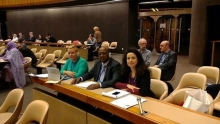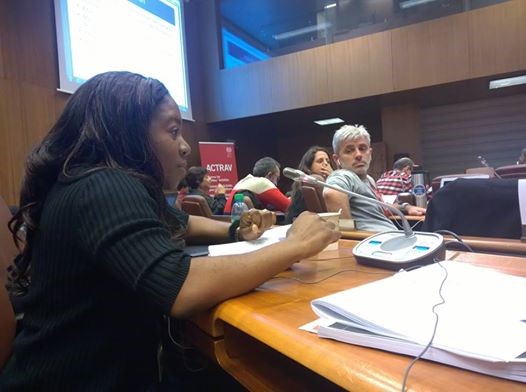Public services and their unions crucial to bridge the Decent Work deficit in Global Supply Chains

Between 30 May and 10 June 2016, the International Labour Organization (ILO) held a general discussion on “Decent Work in Global Supply Chains” within the 105th Session of International Labour Conference (ILC). The discussion was meant to review the decent work performance of global supply chains and to ascertain what steps are needed to ensure that employment led by multinational corporations (MNEs) is decent and upholds the eight fundamental ILO Conventions, including freedom of association and collective bargaining. The ILO produced a background report for this discussion.
PSI representative Roland Inacio of the Curacao Civil Servants’ Union (ABVO) sets
the stage delivering PSI’s opening statement at the opening of the ILO Tripartite
Discussion on Decent Work in Global Supply Chains.
Public Services, Global Supply Chains and MNEs
Public services and their workers are crucial to uphold Decent Work in Global Supply Chains. National labour inspection and administrations, land security, occupational health and safety agencies, and the judicial regulate, scrutinize, sanction and remedy the human and labour rights conduct of multinationals, and implement national and supranational governance systems.
Public services also enter the realm of Global Supply Chains through the transnational delivery of services traditionally deemed under public control, such as utilities, health and education, primarily via the cross-border movement of people. Violations of human and labour rights and poor working conditions in global service-based supply chains are a daily occurrence just like in manufacturing.
This discussion and its follow-up therefore represented an important opportunity for PSI to highlight the linkage between working conditions in global supply chains and public services, and to advocate for related PSI policy priorities such as strong labour inspection, tax justice, responsible public procurement policies and effective anti-corruption regulation within the ILO and its tripartite constituency.
PSI’s contributions to the preparation of the ILO Tripartite Discussion on Decent Work in Global Supply Chains
PSI participated from the onset in the discussion, providing extensive comments and input to the ILO Sector and ACTRAV departments and working with the ITUC and the other Global Union Federations. PSI General Secretary Rosa Pavanelli spoke at the opening panel of the International Workers’ Symposium on Decent Work in Global Supply Chains held at the ILO in Geneva on 15 – 17 December 2015, where she stressed the impact of MNE tax avoidance on the socio-economic development of countries and communities involved in global production and service delivery systems.
Addressing the ACTRAV Global Symposium on Decent Work in the Global Supply Chains she said:
''The Decent Work deficit is a dramatic reality not only in production-based Global Supply Chains but also in service-based ones, as it happens through worker migration in social care, health and waste management services. Global Framework Agreements are good, yet they are not enough to address the overall social impact of MNEs on national governments, societies and their democratic development. As trade unions we need to look beyond the workplace and address the human right harm that MNEs are causing to entire countries when they subtract public resources for education, social security, and other essential services through tax evasion and tax dodging. This is not only a labour issue, but a systemic issue. It is about power".
Tifonie Powell from PSI affiliate the Jamaica Civil Service Association was also at the Symposium and raised the issue of the contribution of Export Processing Zones (EPZs) – a creature of global supply chains - to decent work creation and sustainable development.

PSI succeeded to bring the issue of tax justice and the reform of the global tax system prominently into the debate, as reflected in the Symposium’s conclusions.
PSI also prepared a position paper as a background guidance for the PSI delegation at the ILC and for internal discussion among affiliates. The paper was presented in the PSI Executive Board in May 2016.
PSI participation in the Tripartite Discussion
At the onset of the discussion, PSI representative Roland Inacio of the Curacao Civil Servants’ Union (ABVO) set the stage delivering PSI’s opening statement.
“The payment of a fair share of taxes is an integral part of the social responsibility of business and of multinationals, and a prerequisite for Decent Work and human rights in global supply chains. The resources public institutions need to guarantee the effective surveillance and remediation of Decent Work violations are much too often stripped by systematic tax avoidance occurring under the currently broken international taxation system, which also starves the financing of vital infrastructures and public services from which businesses and multinationals benefit, too. This is why the ILO must actively support the demand that the UN takes on a global reform of the tax system,” said Inacio.
Among the practical options proposed by the Workers’ Group, was the negotiation of a new ILO Standard on Decent Work in Global Supply Chains, a revision towards the ILO MNE Declaration.
Discussion Outcome and Next Steps
The conclusions of the Tripartite Discussion are quite general and employ ‘neutral’ language such as ‘non-standard forms of employment’ instead of precarious work and do not lean towards a concrete proposal (e.g. a new ILO standard or other effective solutions). However, the document recognizes that there is a problem with decent work compliance along global supply chains and acknowledges the primary role of public governance system in upholding it. The conclusions also refer very heavily to the United Nations Guilding Principles on Business and Human Rights, and its related ‘due diligence’ concept, with little or no mention of the MNE Declaration.
The Tripartite discussion also resolved to setup a Working Committee for a meeting of experts, that is of key importance in the roadmap for a standard on GSC. Though not yet in the agenda of the ILO, a tripartite meeting or meeting of experts is usually the previous step before including a standard-setting discussion in the agenda of the ILO Conference. More specific proposals for action will be presented at the next ILO Governing Body in March 2017.
Background documents
- EN PSI opening statement to the ILO Tripartite Discussion on Decent Work in Global Supply Chains
- EN PSI Position paper on Decent Work in Global Supply Chains
- FR Position de l’ISP sur le travail décent dans les chaines approvisionnement mondiales
- ES Postura de la ISP sobre el trabajo decente en las cadenas mundiales de suministro
- DE PSI-POSITIONSPAPIER ZUM THEMA MENSCHENWÜRDIGE ARBEIT IN GLOBALEN LIEFERKETTEN
- SV PSI:s STÅNDPUNKT OM ANSTÄNDIGT ARBETE I GLOBALA VÄRDEKEDJOR
- JP: PSI 姿勢文書 グローバルサプライチェーンにおけるディーセントワーク

